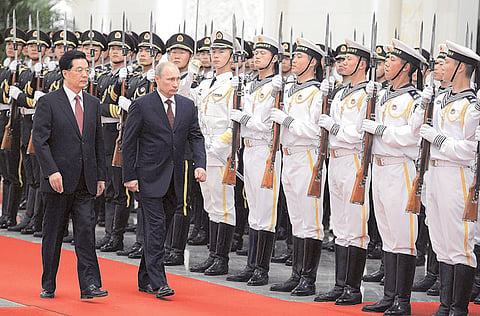Putin meets China leader
Russia, China leaders meet to boost ties

Beijing: The leaders of Russia and China met Tuesday to foster an evolving partnership that has counter-balanced US influence.
Russian President Vladimir Putin arrived in Beijing on his first visit to his country's vast neighbour since resuming the Russian presidency earlier this month.
He later sat down for talks with Chinese President Hu Jintao that are expected to touch on bilateral trade and energy cooperation, and will join a regional summit later in the week.
On Wednesday and Thursday, Putin and Hu will be among leaders attending the annual summit of the six-member Shanghai Cooperation Organisation, a grouping of Russia, China and four Central Asian states seeking to boost regional integration and curb Western influence.
The countries are also preparing for the US departure from Afghanistan.
Ties between the former Cold War rivals have grown steadily warmer over the course of Putin’s decade-long dominance of Russian political life.
Along with close coordination in international affairs, they’ve sought to boost economic ties, particularly in the energy sector, setting a target of raising bilateral trade to $100 billion (Dh367 billion) by 2015 from $83.5 billion last year.
Despite that, disputes and mistrust linger.
Both the sides have wrangled for years about the price of gas to be delivered by two Siberian pipelines.
Russia prefers to link gas prices to oil prices, as it does in Europe, while China wants a lower price.
If Russia’s OAO Gazprom and China National Petroleum Corp can reach a deal, deliveries are to start by 2015.
Putin’s visit follows his attendance Monday at an EU summit in St. Petersburg at which he defended his country’s human rights record, saying Russia has no political prisoners and dismissing criticism of a draconian bill that hikes fines for unsanctioned street rallies.
His visit to China is the first since his return to the presidency in May after stepping down in 2008 due to term limits.
Meanwhile, China’s services industry expanded at its fastest pace for 19 months in May, with new business and optimism about the future robust, according to a private-sector survey of purchasing managers published on Tuesday.
The HSBC China Services Purchasing Managers Index (PMI) rose to 54.7 in May, extending from April’s six-month peak of 54.1.
The survey’s compiler, Markit, cited new business growth as the key driver of the index.
Supportive measures
“This should reduce the fears of a sharp growth slowdown. Going forward, the expected fast delivery of a mix of supportive measures should filter through to further boost services output and employment,” Qu Hongbin, chief China economist at HSBC, the survey sponsor, said in a statement accompanying the index.
The increase in the HSBC Services PMI comes in marked contrast to China’s official non-manufacturing PMI, which showed a second straight monthly decline when it was published at the weekend, easing to 55.2 from April’s reading of 56.1.
The HSBC services barometer meanwhile reflected a strong level of confidence both in near-term prospects and also on a one-year horizon.
The pace of new order growth was the fastest since October 2010, with new product developments and improving demand cited alongside successful promotional activities as helping boost the headline index.
“The degree of confidence was strong, with the index measuring business expectations only slightly lower than April’s one year-high. Companies linked positive sentiment to expectations of new business wins and better economic conditions,” Markit said in a statement.
On the downside, employment growth in the services sector in May was only modest and the increase in staff numbers was weaker than the long-run trend average for the survey.
Average input costs also increased, extending the current period of inflation in the services industry to 31 months.
Higher labour-related costs were the main source of inflation.
And despite the increase in new orders, the backlogs of work in the services sector fell in May.
The latest decrease in volumes of work-in-hand but not yet completed was the fourth decline in as many months, Markit said.
China has increased efforts to support the economy in the face of a deepening European debt crisis and slowing demand at home, fast-tracking infrastructure investment, providing consumption subsidies in some household sectors and pushing ahead with financial reforms to help safeguard growth.
It has eased banks’ required reserves in three steps since the autumn of 2011, cutting 150 basis points in total to 20 per cent and freeing up an estimated 1.2 trillion yuan for fresh lending.
It has also cut taxes and slashed red tape.



